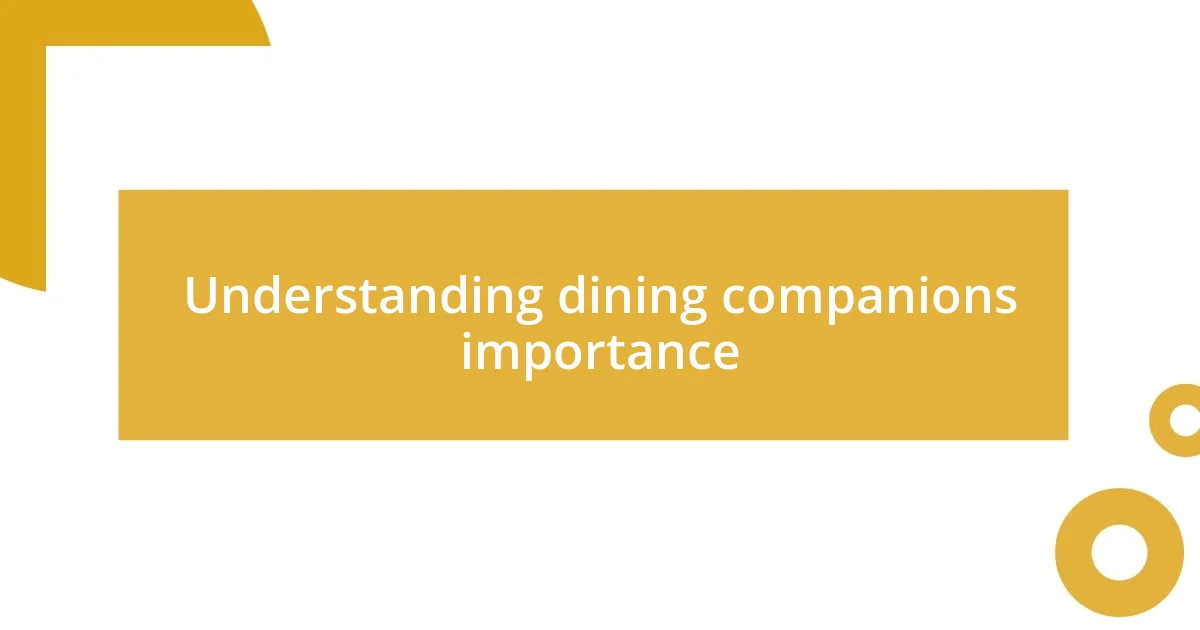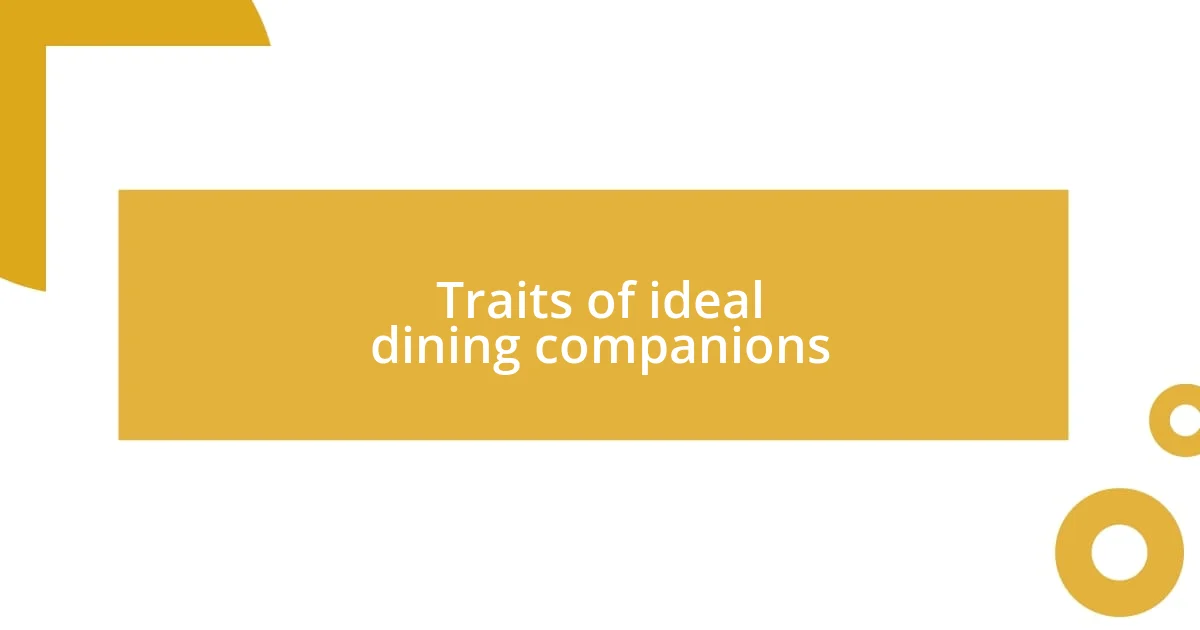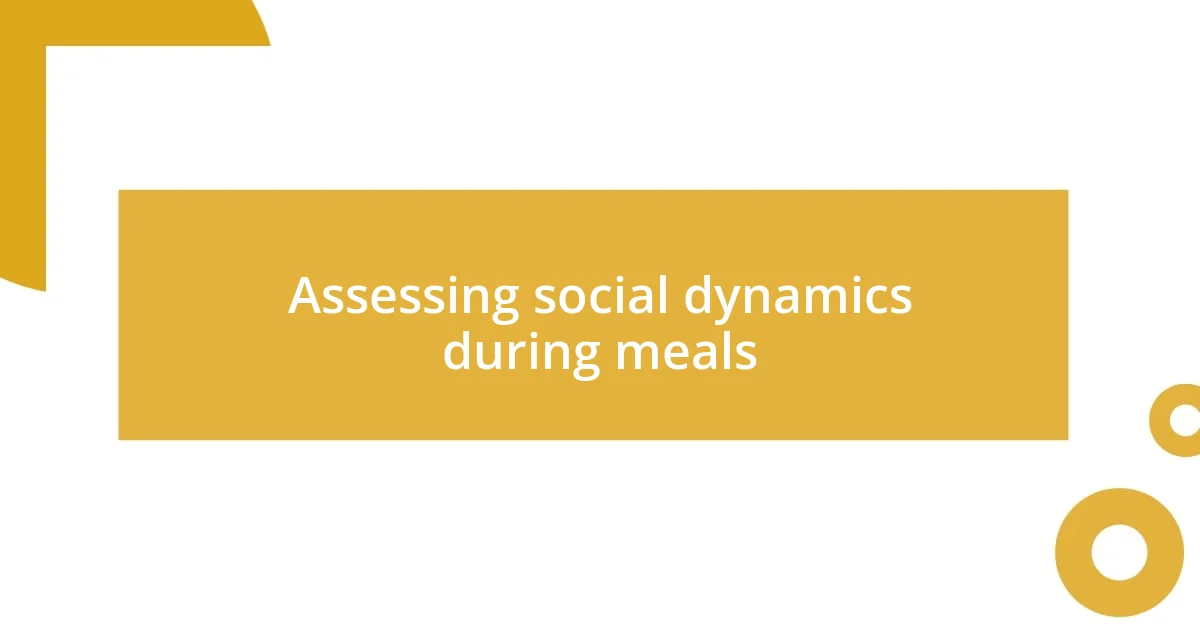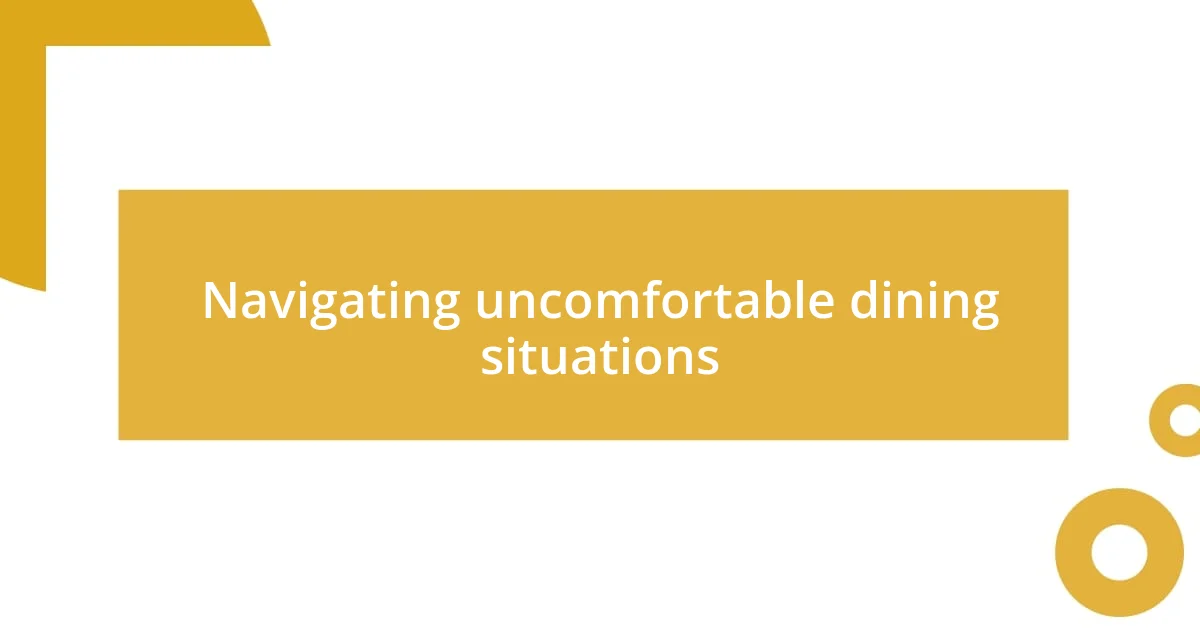Key takeaways:
- Dining companions significantly enhance the meal experience, shaping atmosphere, conversation, and emotional well-being.
- Key factors in selecting companions include their vibe, shared interests, and the occasion, which influence overall enjoyment.
- Being observant and adaptable during meals helps navigate uncomfortable situations, fostering inclusivity and positive interactions.

Understanding dining companions importance
Dining companions play a crucial role in shaping the overall experience of a meal. I remember one dinner when I was surrounded by friends who brought lively conversation and laughter to the table. It made me realize how the right people can turn an ordinary meal into an unforgettable occasion.
Think about it: have you ever felt the difference between sharing a meal with someone who shares your interests compared to dining with someone who doesn’t? The former creates a bond that enhances the flavors of every dish. I’ve found that meals are more enjoyable when the people around me contribute positively, sparking engaging conversations and building connections.
Ultimately, the choice of dining companions can affect not just the atmosphere but also the emotional well-being of everyone involved. Sharing a meal with those who uplift my spirits can make all the difference in my mood. Isn’t it fascinating how the right company can transform our perception of food and time spent together?

Factors influencing my choice
When I consider who to bring to a meal, the vibe of the people is paramount. I’ve had experiences where the mood turned sour simply because someone at the table was negative or critical. It’s a reminder that energy is contagious—positive conversations draw me in, while negativity often ruins the meal’s potential.
Equally important is shared interests. During one memorable dinner, I invited a fellow foodie who appreciates culinary adventures as much as I do. Our shared enthusiasm led to an engaging discussion about flavors and cuisines, which absolutely elevated the experience. Dining becomes a form of exploration when companions are on the same page, enriching both our plates and our conversations.
Lastly, I consider the occasion. Celebrating milestones or casual get-togethers calls for different types of companions. I once hosted a birthday dinner filled with close friends, and their laughter resonated throughout the evening, crafting an atmosphere that felt warm and joyful. It made me realize that the context often dictates who would complement the dining experience best.
| Factor | Description |
|---|---|
| Vibe | The overall energy and positivity of potential companions. |
| Shared Interests | Having similar passions enhances the dining experience. |
| Occasion | Different events require different types of people for optimal enjoyment. |

Traits of ideal dining companions
When I think about the traits of ideal dining companions, I can’t help but reflect on their openness and adaptability. I once had dinner with a group of people who each brought their unique backgrounds to the table. Their willingness to share stories about their cultures sparked a deep appreciation for diverse cuisines and even led to trying out a new dish that I had never considered before. This experience showed me that having companions who are open-minded can turn a simple meal into a delightful journey of flavors and conversations.
Another essential trait is the ability to engage and listen. I recall an evening spent with a friend who always knows how to draw others into the conversation. Instead of dominating the table, she invites everyone to share their thoughts, turning discussions into a beautiful exchange of ideas. That balance of speaking and listening creates an atmosphere where everyone feels valued. Here are some key traits I look for in dining companions:
- Openness: Willingness to explore new tastes and ideas, enhancing the dining experience.
- Engagement: Ability to include everyone in the conversation, fostering a lively atmosphere.
- Respectfulness: Acknowledging different opinions and preferences, creating harmony at the table.
- Sense of Humor: Light-heartedness that brings joy and laughter, making the experience enjoyable.

Assessing social dynamics during meals
As I sit around a dinner table, I’m often keenly aware of the social dynamics at play. I once joined a group where two friends were at odds, each trying to assert their opinions. It created an uncomfortable tension that overshadowed the meal. I ask myself, how can I foster harmony while ensuring everyone feels included? I find that by actively managing introductions and steering conversations, I can help diffuse potential friction and encourage a flow of positive interactions.
I also consider how people interact with one another beyond just their words. One evening, I watched as a guest quietly supported a friend who was shy, drawing her into the conversation without overpowering her. That instinct for reading social cues struck me as essential. Do my companions possess the awareness to uplift others and create an inclusive atmosphere? This kind of sensitivity often turns a simple meal into a collective experience, where everyone leaves feeling appreciated.
In my experience, the chemistry among dining companions can make or break the evening. I recall a dinner where I intentionally mixed extroverts and introverts, hoping to create balance. The result was delightful: the extroverts drew out the quieter guests, leading to unexpected discussions that I still think about. Reflecting on these moments, I realize that understanding social dynamics is an art—one that ultimately enhances not just the meal but the relationships we build around the table.

Navigating uncomfortable dining situations
Sometimes, dining experiences don’t go as planned, and I’ve encountered my fair share of uncomfortable situations. I remember a dinner where one guest consistently interrupted others, dominating the conversation. It left me wondering: how do you handle a situation where the vibe turns awkward? I chose to gently steer the dialogue, inviting quieter guests to share their stories. This shift not only eased the tension but also highlighted the importance of ensuring everyone feels included.
There was another evening when I found myself seated next to an acquaintance who seemed unhappy. I sensed the weight of their discomfort and felt compelled to lighten the mood. Have you ever been in a position where someone is clearly struggling at the table? I shared a funny anecdote from a recent trip, and to my relief, their demeanor changed, a smile creeping across their face. It was a small, powerful reminder that humor can be a great icebreaker in uncomfortable situations, creating an immediate connection.
In navigating these dining dilemmas, I’ve realized the value of being observant and adaptable. If the conversation sours or someone appears disengaged, responding with empathy can transform the atmosphere. Wouldn’t you agree that remaining attuned to your companions makes you a more considerate host? My experiences have taught me that intuition in these moments can make the difference between a tense meal and a memorable one. Ultimately, it’s about fostering a warm environment where everyone feels welcome, even amidst discomfort.

Evaluating experiences for future choices
Reflecting on my past dining experiences, I’ve come to appreciate how each meal informs my future choices. For instance, I once attended a lavish dinner that quickly devolved into gossip. I found myself questioning whether such negativity was worth my time. This incident taught me that the energy of the group can profoundly influence my decision on who to dine with in the future. It’s not simply about the food but about the nourishing company that I crave.
The diversity of personalities around the table also plays a vital role in shaping my preferences. I remember hosting a potluck where each dish reflected the culture of the person who brought it. It sparked incredible conversations and a genuine appreciation for our differences. I realized then how enriching it is to share meals with individuals who bring their unique stories and flavors to the table. Don’t you think that these interactions can lead to deeper connections?
Ultimately, I’ve learned that every dining experience, whether uplifting or challenging, leaves an imprint. The key, for me, lies in evaluating the dynamics and the vibes emitted by my companions. I often ask myself, which traits bring joy to my meals? Knowing what worked in the past helps refine my choices for future gatherings, ensuring I’m surrounded by those who elevate rather than drain the experience.















